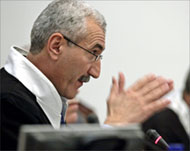Saddam trial resumes after recess
The trial for former Iraqi president Saddam Hussein has resumed after a recess prompted by a dispute with defence lawyers.

The court proceedings were getting under way on Monday following a 90-minute recess, called by the chief judge after all the defence lawyers for Saddam and his seven former colleagues also on trial walked out.
The defence team had been infuriated by the judge’s refusal to address their concerns on the legality of the trial.
The walkout was staged in protest against the court’s refusal to let foreign lawyers speak.
When the defence asked for former US attorney-general Ramsey Clark and former Qatari justice minister Najib al-Nuaimi to be allowed to speak, the trial’s presiding judge Rizkar Muhammad Amin refused.
“We want to make two interventions. The first from Ramsey Clark on the legitimacy of the court and the second from Nuaimi on the protection of lawyers,” said Khalil al-Dulaimi, Saddam’s main defence lawyer.
“Make a written request,” said Amin, insisting that the court was perfectly legitimate.
From the dock, Saddam interrupted: “How is it legitimate when it was set up under the occupation?”
“I just want two minutes,” Clark said in English, but Amin refused.
Walkout
The defence lawyers then announced that they were walking out. Amin’s responsed: “It’s up to you. We must then summon other lawyers”.
Saddam said he would refuse court appointed lawyers before shouting “Long live Iraq. Long live the Arab nation. Long live Iraq”.
 |
|
Judge Amin has not ruled on |
Al-Nuaimi said that the court’s refusal to listen to the lawyers’ requests “violated the rights of the defence” and insisted that the court analyse the question of its legitimacy before the actual trial gets under way in earnest.
Amin said the defence should send him a written memorandum concerning questions about the court’s legitimacy and promised to send a written reply.
Saddam tried to speak to back up his lawyer, but Amin ignored his protests and those of the deposed leader’s half-brother and co-defendant Barzan al-Takriti.
The trial was then suspended to allow defence lawyers who quit the courtroom to confer on their next move.
Third session
The session began at 11am local time on Monday with the introduction of each of the eight accused. As before, Saddam Hussein was the last to enter, carrying a Quran in his hand. He was wearing a Western attire.
Lawyers for the defence were present, including former Clark, wearing lawyers’ robes.
A US official familiar with the court expects three to five witnesses to give evidence, some with identities concealed, as the trial moves into its third session since it began on 19 October, nearly two years after Saddam was captured.
On the eve of the trial’s resumption, a member of the five-judge panel withdrew, citing potential conflict of interest because one of Saddam’s co-defendants has been linked to the killing of the judge’s brother, court officials said.
The trial may continue for up to three days, with up to 11 witnesses appearing.
Eight of the witnesses will have their identities concealed in one way or another, a practice that could raise doubt about the defence’s access to witnesses whose names and faces are not known.
New attorneys
At the second court session on 28 November, proceedings were adjourned for a week to give two of the eight defendants time to find new defence attorneys after two lawyers were assassinated and another fled the country in fear.
In a related development, the UN representative for human rights in Iraq said on Sunday Saddam’s trial would not meet international standards of fairness and transparency.
“Weakness in the system of administration of justice, in addition to the antecedents surrounding the establishment of this tribunal, will never be able to produce the kind of process that would be able to satisfy international standards,” John Pace told Reuters in an interview.
Parliamentary elections
Further delays in the trial are expected in the run-up to the 15 December parliamentary elections.
 |
|
Ex-US attorney-general Ramsey |
Saddam’s defence team has filed another motion declaring that, as former president, he has sovereign immunity, and a third motion asking for more time to prepare. The chief judge, Rizgar Muhammad Amin, has not ruled on those motions.
International observers have raised concerns about the court, which operates under a mix of Iraq’s criminal code, some international statutes and others written specifically for the tribunal, which was formed under US occupation.
They are also worried about the amount of time the defence has had to prepare for a complex case involving allegations of crimes against humanity connected to the death of 148 men after an attempt on Saddam’s life in 1982.